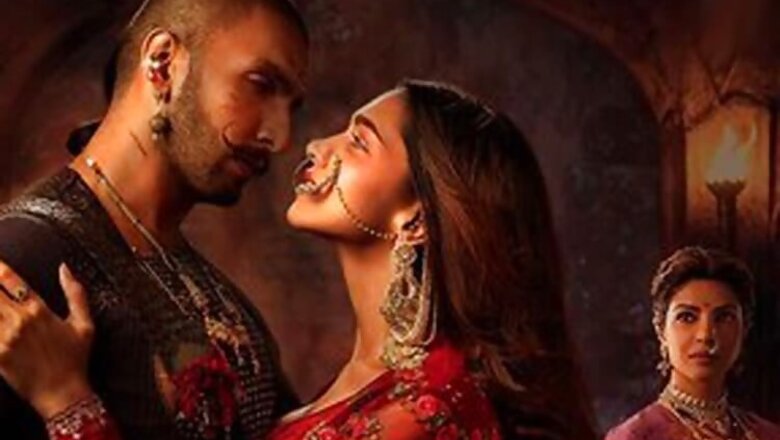
views
There are a few things one has come to take for granted in a Sanjay Leela Bhansali film: a stunning visual aesthetic, immaculately choreographed songs, and an imposing sense of scale. His latest, Bajirao Mastani, doesn't disappoint on any of those counts. This sweeping period piece, set in the early 18th century, focuses on a forbidden romance that consumed Bajirao Ballal Bhat, a brave general credited with expanding the Maratha Empire and winning every one of the 41 battles he fought. But the film also suffers from a condition one might describe as 'Bhansali-it is' – the tendency to be melodramatic, over-long, and highly indulgent.
That’s a shame because Bajirao Mastani hits the ground running. Love blossoms between the peshwa (Ranveer Singh) and Mastani (Deepika Padukone), daughter of a Bundelkhand Maharaja, after our hero defeats a Mughal army poised to invade her father’s kingdom. He ends up upsetting just about everyone when he marries her: from his wife Kashibai (Priyanka Chopra) and his mother (Tanvi Azmi), to the Brahmin priests who reject Mastani because of her Muslim blood.
The film then is largely about Bajirao's continuing struggles to seek respectability for Mastani. Bhansali and his writers script compelling confrontations between his characters to draw out the drama. There is heartbreak, humiliation, sacrifice, and more than a few powerful moments that pack a punch. An attack on Mastani late in the film is impressively staged, as is a scene in which Kashibai witnesses her husband’s indiscretion in a conveniently placed mirror. Not to mention the film’s opening battle sequence, which is nothing short of terrific.
The narrative, however, is hobbled by too many songs, and post-intermission your patience wears thin. As Bajirao and Mastani sink deeper into their doomed relationship, and a dignified Kashibai holds up the third part of this triangle, the film starts to suffer from a hangover of Bhansali’s own Devdas. What’s surprising is the lack of heat in the romance between Bajirao and Mastani. The actors sizzled in Ram-Leela, but their relationship is strictly PG-13 this time around. Frankly, more sparks fly between Bajirao and Kashibai in a scene where she sneaks up on him in the bath.
Like in the director’s previous films, supporting actors serve up strong performances. Azmi is suitably intimidating as the tough matriarch, and Vaibhav Tatwawdi makes a big impression as Bajirao’s brother Chimaji. As far as central roles go, the film benefits from a nice touch of playfulness and humor in Priyanka Chopra’s Kashibai. Your heart goes out to her in scenes where she must confront the fact that she’s not Bajirao’s great love. Chopra brings grace to the character, and practically steals the film. ((pause)) Deepika Padukone as Mastani is a woman of exquisite beauty. You’re captivated by the heft that Padukone lends to her fight scenes, or when her eyes speak more of her suffering than words. Her character, though, is strictly one-dimensional and therefore tedious. Ranveer Singh, meanwhile, has a commanding physicality as the warrior hero, and he completely inhabits the part. He imbues Bajirao with a fiery spirit, and yet allows his vulnerabilities to occasionally slip. It’s a big ‘showy’ part, and the actor doesn’t disappoint.
Ultimately you can’t help being overwhelmed by Sudeep Chatterjee’s eye-watering frames, and the elegant production design. Bhansali delivers a film that’s artistic but exhausting. I’m going with three out of five.
Rating: 3 / 5
What's your reaction to 'Bajirao Mastani'?
Write your review:

















Comments
0 comment